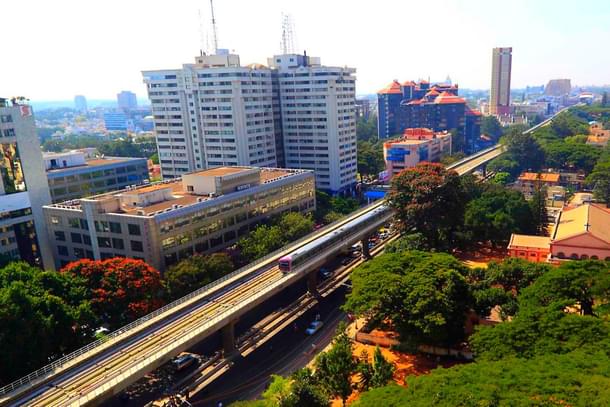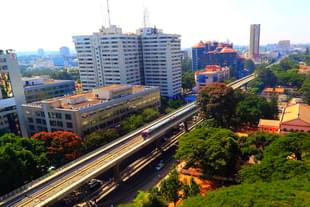Infrastructure
Bengaluru Metro Faces Scrutiny As MP Tejasvi Surya Calls For Performance Audit By CAG
V Bhagya Subhashini
Oct 18, 2024, 05:37 PM | Updated 05:37 PM IST
Save & read from anywhere!
Bookmark stories for easy access on any device or the Swarajya app.


Bengaluru South Member of Parliment Tejasvi Surya’s recent letter to the Public Accounts Committee (PAC) has reignited the conversation around the management and operations of the Bangalore Metro Rail Corporation Limited (BMRCL).
In his formal request to PAC chairperson K C Venugopal, dated 11 October, Surya recommended a performance audit of Namma Metro by the Comptroller and Auditor General (CAG).
Surya highlighted critical concerns regarding delays, cost overruns, and administrative inefficiencies in BMRCL’s ongoing metro expansion projects.
Background: Expansion Plans and Delays
The BMRCL is currently overseeing several phases of metro expansion that are vital for the future of Bengaluru’s public transportation system. This includes the completion of Phases 2A, 2B, and 3 with the aim of extending the city’s metro network by 100 kilometres (km), beyond the current 73 km.
These extensions will serve major transit corridors, including Silk Board, K R Puram, and Hebbal, areas notorious for traffic congestion.
However, despite the ambitious plans, the BMRCL has struggled with multiple delays, most notably in the commissioning of a 3.7-km stretch between Madavara and Nagasandra and the 18.8-km Yellow Line between Bommasandra and R V Road.
Surya’s letter emphasises the significant operational delays, particularly the tardy procurement of rolling stock and the failure to operationalise already completed lines.
One key point in his letter is the delay in acquiring the 216 coaches required for the Yellow Line, which remains incomplete despite civil works reaching 90 per cent completion, as reported by the Deccan Herald.
The Pink Line, a critical part of the expansion project, is also suffering setbacks. Manufacturing of its train sets only commenced in August 2024, pushing its projected completion to late 2026.
These delays will mean that commuters continue to be inconvenienced amid worsening traffic congestion, a long-standing problem in Bengaluru. The city’s productivity has also been adversely affected, as commuters face extended delays and detours due to the slow progress of metro construction.
Surya’s Push For A PAC Audit
The crux of Surya’s letter lies in his call for a comprehensive performance audit of BMRCL’s operations. His request is not just about addressing the immediate concerns of delays but focuses on a larger examination of the financial discipline, project management, and operational efficiency of the corporation.
According to Surya, the issues with BMRCL are systemic and point to a failure of accountability at multiple levels. The audit, if conducted, would cover several key areas:
Cost overruns: Many of BMRCL’s projects have exceeded their original budgets, with delays significantly contributing to escalating costs. A thorough audit would investigate the reasons behind these overruns and assess the financial burden on public funds.
Impact on traffic congestion and productivity: The delay in completion of metro projects has exacerbated traffic congestion in key areas of the city. Surya highlights the associated economic costs, including the loss of productivity due to extended travel times for commuters.
Environmental Impact: As metro lines remain incomplete, the reliance on road-based transportation has increased, worsening vehicular emissions and contributing to Bengaluru’s rising air pollution levels. Surya emphasises that the environmental toll must be accounted for in the audit, with a focus on whether the delays have offset the anticipated reduction in carbon emissions from increased metro usage.
Project timelines and the 2031 mobility plan: The BMRCL has an ambitious target of completing a 317-km metro network by 2031, outlined in the Comprehensive Mobility Plan. The audit would assess whether the current strategies are sufficient to meet this goal and whether BMRCL is on track to deliver on its promises.
Administrative accountability: Finally, Surya’s letter points to persistent administrative failures, including a lack of responsiveness to previous calls for corrective action. The audit would scrutinise the organisational structure and management practices within BMRCL to determine where systemic inefficiencies lie.
Implications For Bengaluru’s Metro Expansion
Bengaluru’s Namma Metro is the second-largest metro system in India, currently serving over 8 lakh passengers daily. With over 101 km of new metro lines under construction, the success of these projects is critical to the city’s future mobility.
The PAC audit, if conducted, could have far-reaching implications not just for BMRCL but for public infrastructure projects across India.
By calling attention to these delays and operational failures, Surya has highlighted the urgent need for reform within BMRCL. His focus on transparency and accountability underscores the importance of ensuring that public funds are used efficiently and that metro projects deliver on their intended benefits.
The next few years will be crucial for BMRCL as it seeks to expand Bengaluru’s metro network to 222.2 km, following the recent approval of the Orange Line (44.5 km) by the central government. However, achieving this goal will require significant improvements in project management and operational efficiency.
Surya’s call for a performance audit is a critical step in that direction, but the real test will be whether the PAC follows through and whether BMRCL can address the issues identified in the audit.
V Bhagya Subhashini is a staff writer at Swarajya. She tracks infrastructure developments.





